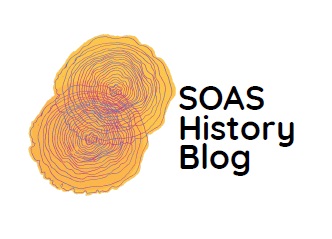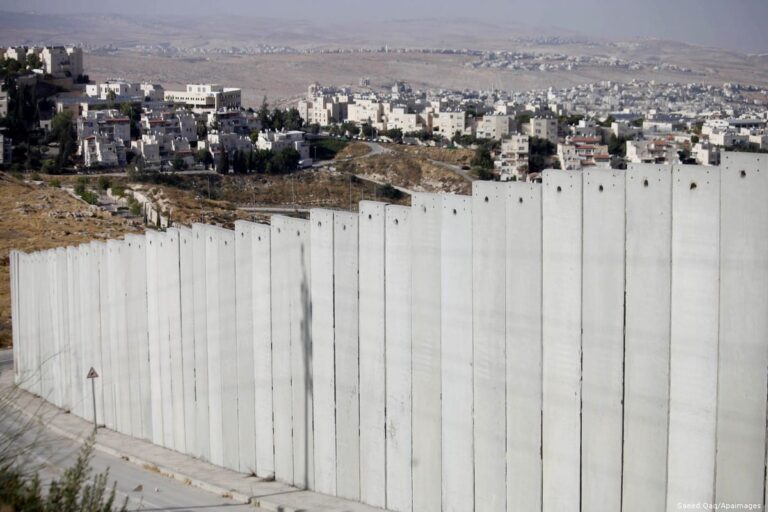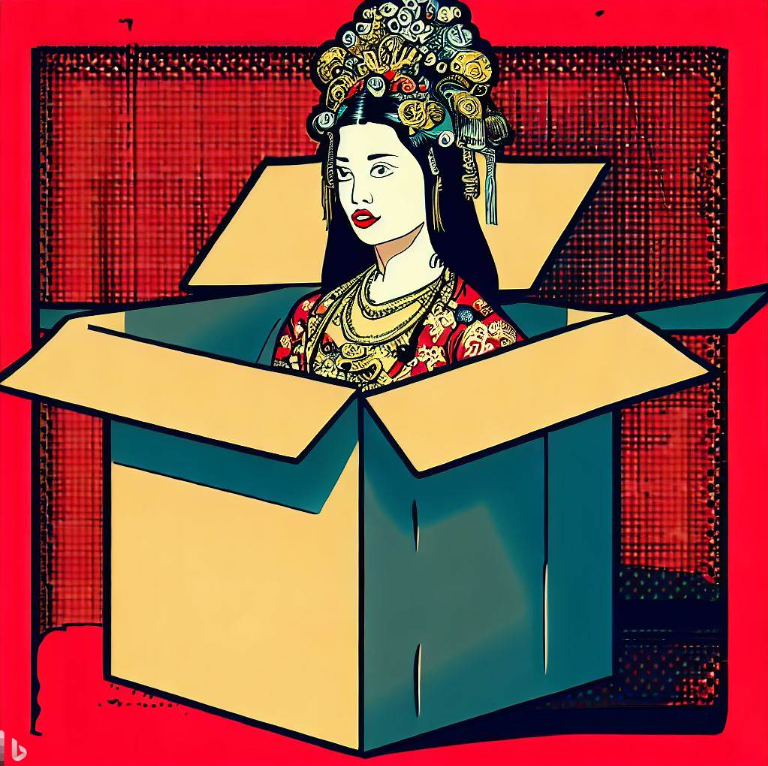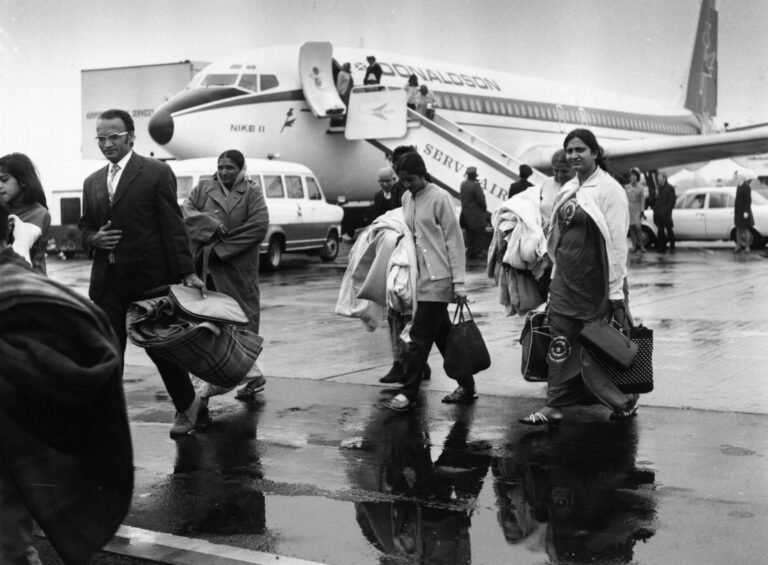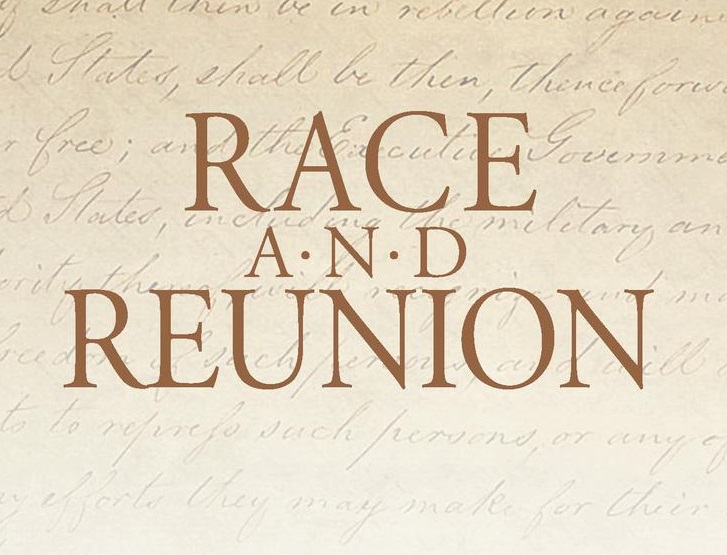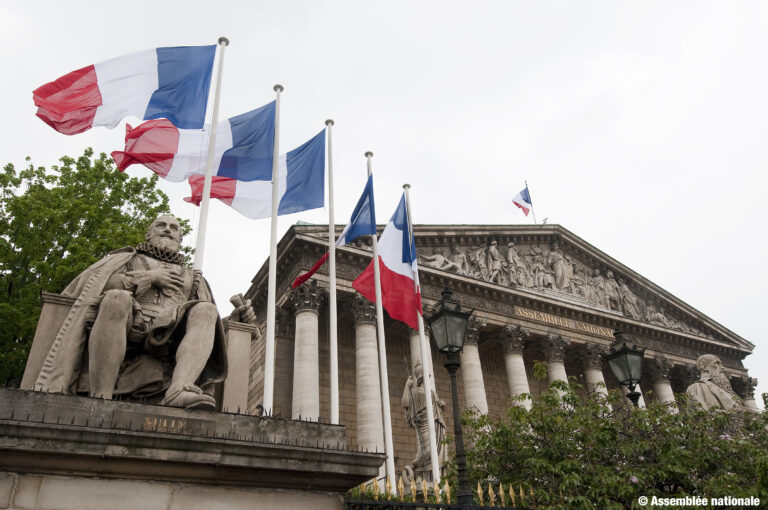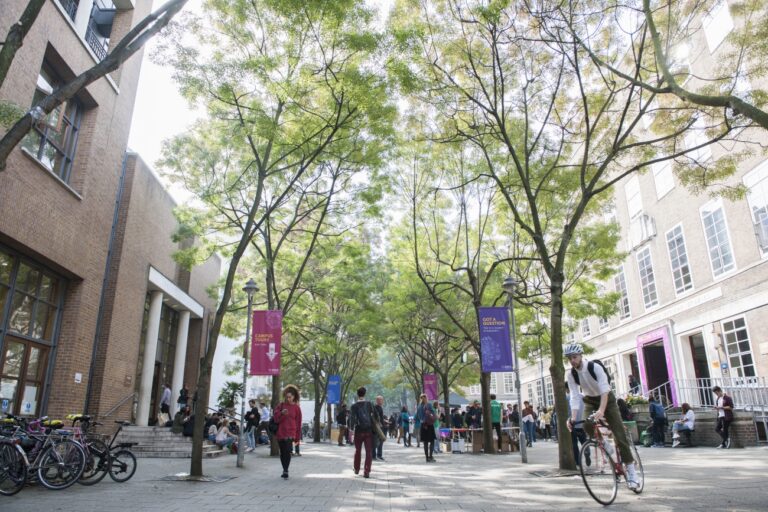SOAS History Blog Podcast Ep. 10: Monarchy and Pluralism in the UK
More about this episode

Dr. Ellan A. Lincoln-Hyde
Recording, editing, production, and transcription
they/them
Ellan (eh-LAHN) is an Australian-trained freelance researcher and multi-disciplined performing artist, and currently lectures in Liberal Arts and Interdisciplinarity at King’s College London. Their PhD research at SOAS explored the spread of Western classical music in China. Ellan has previously worked for The Australian Ballet, The Australian Federal Ministry for the Arts, and Opera Australia. Ellan is also co-founder of The (In)Equal Temperament project and former founder/director of the Con to Kabul charity concert series.
KCL Profile: Dr. Ellan A. Lincoln-Hyde
Podcast Transcript
Ellan (voiceover): This is a SOAS History Blog podcast. To learn more about the SOAS History Blog, go to blogs.soas.ac.uk/soashistoryblog.
In a global era of ever diminishing influence for the construct of monarchy, and the Commonwealth specifically, why did people queue for hours to pay respects to a deceased monarch? In the latest SOAS History Blog episode, we investigate the motivations behind this phenomenon through interviews with those who participated in Queen Elizabeth II’s lying in state. Recorded on September 17, 2022, accompanied by a colleague from sociology, I wanted to understand the reasons behind people’s desire to be part of this event. However, many interviewees struggled to articulate their motivations beyond cliched [00:01:00] responses. Our first interview was with a pragmatic barista at the start of the fourteen hour wait.
Ellan: Jonas, so, um, you’re here and you’re running a little coffee stall here at just beyond Southwark Park, just where the queue starts. Why is it important for you to be here?
Jonas: Today? Well, firstly, to make some business, basically. Uh, but secondly, also, it’s nice to be able to provide a service. And the people that have come to the coffee stand have really been grateful and happy and it’s created a great vibe. It’s almost felt a little bit like a festival, in a way. And that’s, that’s, that’s quite nice. So, when I first arrived Thursday night, I was a little bit nervous about how I would go and being here in the middle of the night on my own, with a coffee stand on the middle of the street, in Bermondsey. Um, I was a bit, I was a bit nervous. But then as soon as people started coming, you know, it was great [00:02:00] and I loved it. I actually think it’s been really fun.
Ellan: You said you might not be the best person to interview, because you wouldn’t cue yourself?
Jonas: Because I don’t really care about the queen. So I wouldn’t cue myself. But I do understand and respect… that it means a lot for a lot of people, and the thing that I really appreciate about it is how it brings people together. I’m seeing that now. You know, I’ve always known, sort of known it, but now seeing it like, you know, all these different people coming up together, there’s a good spirit. It kind of feels like it’s bringing together a country that’s very divided. So I appreciate that aspect, but I’m not a royal supporter, so therefore I find it a bit absurd that people will queue just to see a cupboard.
Ellan: Do you think there would be as many people queuing if we weren’t as a point of economic crisis right now?
Jonas: That’s a very good question. Probably not. Probably not. I do sense that people have a hunger for things that brings them together. You know, there’s been quite a few people who also said to me that they weren’t royal supporters, but they… They sort of came because of them. Okay, there’s really some different, um, Classes in society and from different backgrounds. Um, A bit more so, you know, I thought maybe it would be, you know, Pure royalists coming with, you know, British flags and looking very patriotic. But that’s not the case. There’s definitely very different types of people here. And I quite like, quite like that. [00:04:00]
Ellan: So, we just tried to interview some, um, police officers and, similar questions to the security people, but we almost, almost got them to talk. They were thinking about it, but, I understand why they wouldn’t.
Sociology colleague (SC): Oh that’s very nice. Someone’s got a free toilet, I wonder if they’ll speak to us .
Ellan: Can we interview you? Can we interview you?
Henrietta: Interview me?
SC: Yeah! For research…
Henrietta: Ok!
Ellan: It’s lovely to meet you! This is fantastic what you’re doing this for people. Why have you opened your toilet up for free use for everybody?
Henrietta: I’m doing this for the country and for the queen. You know, I went there two days ago. It took me eleven hours from here to the place. And I know a lot of people were actually desperate, you know, and I felt… I have three toilets. One is down here just by the front door. And there’s thousands of people that has been passing this [00:05:00] place, you know, so why can’t I just open it? Even yesterday, I was supposed to take some people to the second floor toilet because they were desperate and there was a queue. So I opened the door at 7 in the morning and at 11 o’clock, 11pm, I wanted to sleep. So I felt guilty but I said, I have to go to bed now because I was really tired. And I closed it. So this morning I woke up late, 9 o’clock I opened it again and I said, everybody use it and… we have to do this for our Queen. Everybody loves the Queen. The Queen is a great woman for the country, for the whole world. You know, and um, I think that’s the little bit we could do to help everybody. A lot of people, I spoke to a woman that came from Houston this morning, you know…
SC: Houston, America? Did she use your toilet?
Henrietta: Yes!
SC: Excellent!
Henrietta: I felt, here they’re really making effort. This is a little, this is nothing. It’s not costing me anything and like I said to them, people say, “oh charge money”. I said, “no, this is my water”. I don’t have water meter. I [00:06:00] have a basic charge.
SC: It’d be different if you had a water meter…
Yes. I said, I have a basic charge. And whether I flush once or one million times, it doesn’t cost me more. And the toilet’s not going to shrink, so why don’t you just do it for people? Where I come from, we don’t make money from death. We give. Normally, if we achieve, if, if it’s not the queen, my friend die, I can have 500 pounds or 1, 000 towards the funeral. That’s what we give, we don’t receive from. So I’m a bit upset people, uh, selling tea and coffee and more money, like, exploiting people, I don’t really feel good. [ phone rings] Who is this now, sorry.
Ellan: We’re probably done now, what was your first name?
Henrietta: Henrietta.
Ellan: Are you from Norway today? Have you come all the way from Norway to do this? Yeah? So how long have you been travelling thus far?
Norwegian couple 1: But we arrived to London yesterday.
Ellan: Yeah. And I can see you’re dressed in full uniform here.
Norwegian couple 1: Of…? It’s Navy. Naval officer
Ellan: And why was it important for you to come today?
Norwegian couple 1: Well, my, he’s my, uh, [00:07:00] husband. And we are, uh, very proud of the Queen and Royal family. So, we just wanted to go, come here and, uh… Pay, pay tribute and respect for the, for the Queen.
Norwegian couple 2: Our King is the Queen’s third cousin. I mean, Norway and Britain always have had a tight relationship, the royal families.
Norwegian couple 1: And of course this is not happening ever so often. Of course, so, so it’s a, yeah, once in a lifetime perhaps for, for us and something that we will remember the rest of our lives.
‘Marker in time’ man: Actually, I’m here because it’s a significant marker in time.
SC: Ah, tell us about that.
‘Marker in time’ man: I don’t have a that good memory. Sorry, some people have very good memory. They can remember stuff. I don’t. But my life seems to be flowing along. Days merge into days. And this is a marker in life. This [00:08:00] event, I will remember definitely until I die. And it’s a grey, it’s a grey string, so to speak, in life. But this has put a knot in it.
Ellan: So, what’s your first name?
Janet: Janet.
Ellan: And you’re sitting here, watching the cue, and you’re doing some knitting…
Janet: My husband’s in line, so my back got a little sore, so I thought I’m going to sit for a little bit and knit, and then I’ll catch up to him.
Ellan: And how long have you been waiting now?
Janet: Three hours.
Ellan: Have you flown in today? Do you live in the UK?
Janet: No, we were away on a holiday and we were supposed to fly back today. I’m we were on a cruise [00:09:00] that landed in Southampton and we were gonna fly out of Heathrow today but we extended our stay so we could stay ’til Tuesday.
SC: I’m really curious about lots of people like you… so you’ve had to spend money to go back on a different, you know, on a different day. People are paying for extra hotels. People have come, often, quite some way. We spoke to someone who came from Norway, um, just to be here today. And so I’m trying to understand just why it’s so important to be here and to devote quite, not just time, but resources, um, to be here and, and pay respects. What that means in the context of your life and what you can say about this moment.
Janet: Well, it’s um, I look at it that she gave her whole life to us, 96 years. So what is, what is a few days and a little bit of money? It’s the least we could do to show our love for her.
SC: It’s the love. It’s the love, and there we go. Because money’s important. And people don’t use it frivolously, generally, unless they’re very, very wealthy. And so, the link between the money and the love, I think, is really interesting.
Ellan: Yeah, so I see your t-shirt says faculty of human sciences. Are you still involved?
John: Yes! Uh, no, no, no, this is from many moons ago. Class of ’96, so yeah, it’s a while ago that I graduated from Plymouth. I was a sociologist.
Ellan: What are you gleaning from this from a sociological perspective?
John: Oh, now that’s a difficult one. Um, I think there’s a certain amount of pilgrimage about it. There’s a certain amount of, um, I suppose it’s an upswell of feeling from, you know, having lived through things like the pandemic. And it’s nice to have a collective social experience that people can be part of, you know, regardless of their age or gender or ethnicity. It’s something that can unify and there’s so few things that do that nowadays.
Ellan: So what do you mean by nowadays? [00:11:00] Do you think as many people would be here if we were doing a bit better?
John: Uh, well I just think, you know, um, well actually what do I think? That’s an interesting thing to say. Um, I’m not sure that it… I think world events have probably caused a lot of people to go through a lot of trauma. Um, and, you know, there’s a lot of, uh, people that have had to spend a lot of time on their own over the last few years, and I suppose this is kind of a, almost a sort of upwelling of, you know, collective social feeling that is, you know, it’s displaying itself in the people that you see here. I mean, it’s, it’s, uh, it’s quite wonderful. Again, you know, you have, uh, you know, a, a global downturn, you have a war in Europe… you know, there’s significant world events, and you know, I don’t suppose it’s any worse now than it was ever before, but it’s just nice to have something that you can celebrate, well, not celebrate the event [00:12:00] itself, but, you know, celebrate life.
Ellan (voiceover): While some interviewees had spent hundreds of pounds on travel from around the world, others were present for commercial gain or political action. We spoke with a protester returning from a Justice for Chris Kaba rally, spotted a member of the queue sporting a Hindu nationalist t-shirt, and a man dragging a life sized cross on wheels over Westminster Bridge while handing out smiley face stickers. But these overt statements were exceptions among the crowds, as were the few union jack clad individuals in line or in Parliament Square handing out flags.
Ellan: So we’ve seen a couple of these signs today, this one says Chris Kaba could you explain what that is and why you’re walking backwards down the line with it today?
Justice for Chris Kaba protester: So it’s a protest for a man who was shot in Streatham by a police officer and died afterwards. He’s got a fiancée and unborn child and there was a protest outside New Scotland Yard today. His brother spoke, it was very moving. And, [00:13:00] um, I think it’s a shame that we don’t live in a society that’s a bit more, like, pluralistic, and you can be allowed to both grieve the Queen and be aware of other things that are going on at the same time. But, it’s been an interesting experience walking this way. It definitely doesn’t feel like… Uh, I mean it feels like a political statement, you know, and you shouldn’t, I mean I feel worried that someone’s gonna shout something at me, and I shouldn’t feel like that. You can have all of these things at once, like it doesn’t need to be exclusionary.
I thought the Queen was great, she was like, she had some, you know, she had a remarkable life, and she made some interesting comments. Sometimes when the microphone’s on, and I think she pretended that she didn’t think it was on, you know, you know, and there’s space for that, and then there’s space for the real thing, which is also going on for a lot of people, which is, you know, you can’t walk down your street safely because you’re young and you’re black, and you’re a man. People have been stopped and searched like thirty times by the time they’re 30.
Ellan: Is this like a photo project or something you’re doing?
A Levels student: I’m just tagging along.
Ellan: So, are you just pulling people out of the queue and like just putting out the queue?
A Levels student: That’s my dad, he’s been commissioned by Getty. Yeah, he’s doing the portrait series.
Getty Images photographer: But I think one of the interesting things that I do find, is there is a mixture between people wanting to pay their respects, and to be part of a big event. And they’re quite contradictory viewpoints. You know, they’re not necessarily aligned. So that’s kind of quite interesting. Not huge amounts of young… you know, 16 to 23 year olds. Not seeing too many of those.
Ellan: Are you going to go see her? Or is this enough for you?
Getty Images photographer: No, I won’t. I haven’t got the time. And I think, I’m not sure I would either, really. I’m not entirely… Yeah, no, even if I didn’t have the time, I wouldn’t go. It’s not, I really respect her, but I just, I’m not that type of person, I don’t really, I’m not entirely sure what it would show.[00:15:00]
SC: We’re seeing that people are finding it very hard to articulate. What it is, why she means so much to them, and it all seems to be about symbolism. And that’s the thing about symbols, people can’t really articulate it because they’re, they’re almost imposed on you: she’s on the money, she has these appearances once a year on TV, there’s like, the buildings. There’s a pervasive sense in, you know, you are definitely, we have a queen and, and infrastructure. And that is the symbol of the UK. And I think people find it hard to articulate that which has been subconsciously ingested is the wrong word, but…
Ellan: Cultural hegemony.
SC: Is that what it is? I don’t know what that means.
Ellan: It’s basically where the values of a certain class are imbued within the [00:16:00] population, such that the ‘common sense’ default is the values of one ruling class. So it’s hard to articulate what the value is because you don’t actually hold it, you’re not part of dictating what it was.
SC: And yet you’re grateful for it, and you feel that you should come and pay respects to it.
Ellan: So a little bit of my questions here today is like, can I find someone who might be going along for more the reasons I was going, which was, I want to, sort of, see the person there because it’s so arbitrary. I want to make sure that I bear witness to this point of history because my country could change quite a lot in the next couple of years with the passing of the Queen, because it was always the thing in Australia that ‘the republic’ doesn’t happen until the Queen’s dead.
SC: There’s been quite a few references to Commonwealth and it hasn’t been along those lines. It’s been more [00:17:00] along, she was great for the Commonwealth…
I haven’t heard someone say great.
Ellan: I’ve heard someone… they’ve said it’s important for us to come in for our families. So we heard someone say that and we also heard someone… A reporter said that he’d heard that, uh, the photographer said that he’d heard that, and we also heard it from a couple of other people who are from Commonwealth nations who, um, said that they’re there to say thank you, but also on behalf of their families. But I don’t think anyone said the Commonwealth was great.
SC: Okay, fair enough.
Ellan (voiceover): We found that many people repeated phrases like, “to give thanks”, “to pay respects”, “for her service”, and “for what she has done”, but struggled to define what these phrases meant when asked. Others were present to be part of the historical occasion, to link their personal feelings to a community. And others saw the Queen as a mother figure. Some were there by chance, such as a group of Thai exchange students or a Dutch couple [00:18:00] on a holiday trip.
Hey everyone, do you mind if I just ask you a couple of questions? Like, why are you here today?
Thai student group 1: We are Master Degree students. We just arrived, um, London last week.
Ellan: Where did you come in from?
Thai student group 1: Thailand.
Ellan: So, are you going to join? Or are you just watching it?
Thai student group 1: Yeah, just looking around. It’s interesting but there’s some kind of this event in our country, like, three years ago? Yeah. For our king. For our previous king as well. So it’s not that, it’s not a new thing for us.
Ellan: I think it’s a bit new for a lot of people in the UK because it hasn’t happened for 70 years. But obviously in Thailand it’s happening a bit more frequently.
Thai student group 1: At that time there was a very long queue, an overnight queue as well. So they’re not, not, um, our new thing.
Parliament Square group 1: Um, I lost my mum in February, so I, for me I see it as a way that [00:19:00] I’m also using it to mourn my mum, to respect the Queen. Because she’s really been amazing, you know, to all of us. Yeah, I, I, I wasn’t in the country, I was in the States, so I had to cut my holiday short five days to come back home.
SC: Now we are hearing this, lots of people are either not flying back when they were supposed to fly back so they can stay here and pay their respects, or people are coming to the country, spending a lot of money.
Parliament Square group 1: Yeah, I was, I was meant to be in the States until the nineteenth [of September] but I had to cut my holiday short and come back.
SC: Shows how much she means to people that do that.
Ellan: Have you listened to that? Do you have anything to add?
Parliament Square group 2 (couple): No, we’re on holiday.
Ellan: You’re on holiday! Where are you on holiday from?
Parliament Square group 2 (couple): From the Netherlands.
Ellan: From the Netherlands? So you just happen to be here at the same time? You thought, why not?
Parliament Square group 2 (couple): Yeah, why not? Coincidence yeah.
Ellan: So, having been caught up in this, in part of your holiday, and not necessarily intending to be here, what do you make of it?
Parliament Square group 2 (couple): I think… It’s very [00:20:00] amazing how people are in love with the Queen, because we also have king, we have a king, but people don’t react like people here in England.
Ellan: How would it be different, do you think?
Parliament Square group 2 (couple): No, I think in the Netherlands we are more cold, I think.
Ellan: So you’d be like, “well there you go, they’re dead”.
Parliament Square group 2 (couple): Yeah, people are more down to earth.
Ellan: And you, eagle eyes, saw my Australian pin. Have you come from Australia, or did you just notice that?
Parliament Square group 3: No, I’m a Kiwi, but I’ve lived here for 22 years.
Ellan: Oh, okay, right. So have you come specifically to London today to see it?
Parliament Square group 3: No, I live in London. Um, and we, yeah, I’ve been down with my family. They’ve gone home. But, um, it’s just, there’s a bit of history, uh, being part of history. I think it’s really important and, but there’s also, it’s quite interesting. I think the Queen’s death affected me in a way [00:21:00] I wasn’t expecting. I think it, you know, goes back to, you know, my mum died in New Zealand in December, 2020. I wasn’t able to go there and she was of a similar era to the Queen and it’s been really strange how that, I think, has, you know, the Queen’s death has really sort of affected me way, in a very unexpected way, much more than I anticipated. And I think that’s sort of, part of why I sort of want to be here as well, um, cause the Queen is a year, a year younger than my mother, right.
Ellan: So they’re a very similar age group and part of, part of time.
Parliament Square group 3: Yeah, so they’ve sort of gone. And sort of very similar values and, you know, not that I’m comparing my mother to the Queen in any way, but you know, that sort of era of those values and stoicism and not complaining and just sort of carrying on and getting things done and respect and dignity and all that sort of stuff .
Ellan: It’s got so hectic that even the police [00:22:00] officer was like, I don’t know where the queue is anymore. The queue’s in your mind.
SC: She didn’t say that!
Ellan: No, but she’s just like, “it’s just become so big, I don’t know where the start of it is, I don’t know where it goes”.
SC: Yes, she did speak about it as if it had its own life.
Ellan: Yes, The Queue.
Ellan (voiceover): We couldn’t include everything in this podcast, such as the experience of meditatively moving through the architecture of the city, the sheer enormity of people involved, or the ever present but fairly unapproachable police, security and allied services. At one point, my colleague and I were surrounded by six officers simply for approaching a uniformed officer. A firefighter hesitantly admitted that personnel were chiefly present to respond to extreme acts of violence. And even through all this, London’s buskers kept playing.
Ellan: Just under twelve hours? And why was it important for you to come today?
Hong Kong group 1: Um, so, we sort of came from Hong Kong and being sort of part of the UK colony, the Queen was quite important to us, for people in Hong Kong, even though, um, we was all like, left the UK after a few years. But, um, I feel like the Queen has quite attachment to us, uh, as Hong Kongers she has been in Hong Kong, she has been in Hong Kong for twice, I think, in the past. And really, we really feel that connection with the Queen. Like, she was a part of our everyday lives. Um, like on our coins, on our streets. So we felt that it was really important to sort of pay respect, and also “thank you” for everything that she’s done through the past few decades. Um, well, to me personally, she was all, she was like a figure [00:24:00] for us. It’s someone that we, um, it’s almost like the figure of the UK, that it’s the connection between Hong Kong and the UK. That’s how we see ourselves. Because obviously we’ve went through prime ministers and governors of Hong Kong, but then, the Queen has always been there as part of the connection point between the two countries. So, um, to me that was one of the, um, sort of biggest point. Obviously I haven’t been through all these 70 years that she has, you know. So, um, it was more of a retrospective view for me. But, yeah.
Ellan: And what was it actually like inside?
Hong Kong group 1: Um, it was very solemn. It was quiet. But then, when I looked at the coffin, it felt that, um, although the queen was like a really strong figure, she was a really special figure throughout her life, after death, I could almost see, um, I couldn’t imagine that she would fit inside such a small box. Um, and it’s almost like… It’s like a tiny space for such a huge figure for us.[00:25:00]
Sri Lankan family 1: We were there about, uh, uh, exactly 12 hours. We were in the queue. But before that, we came from, I mean, I came from nottingham. So I came to one of my friends house and stayed there yesterday, and we are from Sri Lanka. She was the, she was the Queen for us ’til 1972, because we were one of the colonies. We have a good, big respect for her. Actually, and I am thinking, it would be better for us to be here, be the, be under her rules, than getting, uh, uh, independent.
SC: Oh, really?
Sri Lankan family 1: Yeah, because after being independent 70 years, it’s bankrupt today. People have nothing to eat. People are suffering. And she was, when in this country, such a marvelous way. [ You are] 66 million, and [00:26:00] we are 22 million, but still we are bankrupt and our, our politician could not survive us. It’s so sad to see her like that. And we have to say goodbye to her, that’s true. But, um, we felt very sad about, very sad. Because she was like a mother to us, or I don’t know, to the whole world.
Ellan (voiceover): It’s important to note that our interviews were not conducted under formal research conditions. And our own biases have influenced the questions we asked and the responses we received. As we approach the coronation of King Charles III, we hope this podcast allows for pluralism, as one participant put it, and provides space for reflection on instances of cultural hegemony in the UK today.
You’ve been listening to a SOAS History Blog podcast. This episode was edited and produced by Ellan Lincoln-Hyde. To learn more about the SOAS history blog, go to blogs.soas.ac.uk/soashistoryblog, or follow us on Twitter @soashistory and Instagram @soashistoryblog.
Additional music: Carlos Carty.
SOAS History Blog, Department of History, Religions and Philosophy, SOAS University of London
